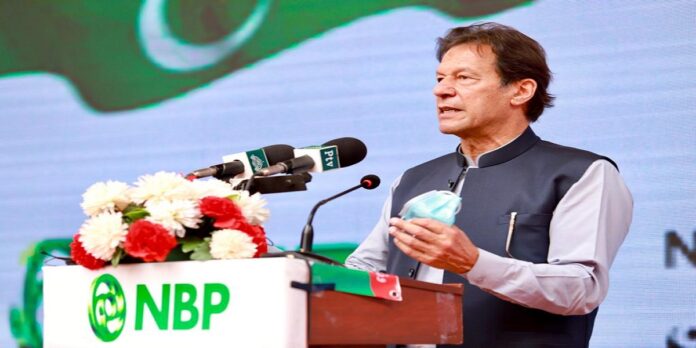QUETTA: Prime Minister Imran Khan on Wednesday Imran Khan said that the government was focused on bringing a revolution of prosperity in Balochistan through projects of infrastructure and human development.
Addressing the groundbreaking ceremony of three roads under the National Highway Authority (NHA), the prime minister said that Balochistan had been long neglected in the past and the government would take every step to minimise the suffering of locals.
PM Imran said that despite financial constraints, his government was committed to diverting funds towards the development of Balochistan.
The prime minister arrived in Quetta on a day-long visit launched the projects, including the construction of the 162-kilometre Ziarat Harnai Road, the 23-kilometre dualization of Quetta Western Bypass (N-25) and the construction of the 11-kilometre Dera Murad Jamali Bypass (N-65).
The prime minister mentioned that compared with the 1,100km of roads constructed by previous governments in 15 years, his government completed 3,300 km in two-and-a-half years.
He said that the entire area along the western route of China-Pakistan Economic Corridor (CPEC) would be developed.
PM Imran said that caring for humanity was the main driving force that placed the nation at a high pedestal of morality.
He regretted that had serious steps taken in past, the country would have undergone immense development.
He termed ‘elite capture’ responsible for the economic division in the society and stressed the need for a model of development for all, including rich and poor.
PM Imran said that Balochistan suffered apathy of previous rulers who had the mindset to ignore the province.
However, he said, his ideology was about making Pakistan rise by uplifting its weaker segments.
He also said that China’s development and its strategy to bring people out of poverty was exemplary and added that Pakistan could learn from the same model.
He mentioned that after Khyber Pukhtunkhwa (KP), the government was expanding the network of Rs 0.1 million health insurance per household in Punjab and Gilgit-Baltistan (GB), and said the same would be discussed with the coalition government of Balochistan.
He said that the project of direct subsidy to farmers on seeds and fertiliser under Kisan Card had been launched while 80 per cent of data of deserving families had been registered for Ehsaas socio-welfare programme.
Balochistan Chief Minister Jam Kamal Khan said that during the last 15 years, the previous governments left several development projects in tandem, while the incumbent was focused on their completion.
He emphasised on enhanced connectivity of Quetta with Naseerabad and Sibbi through dualisation to facilitate farmers and traders from adjoining areas.
He said that the construction work on roads and dams would ensure the development of militancy-hit areas that had long witnessed unrest and suffering.
He also said that the provincial government was spending Rs35 billion out of its own resources for the development of Balochistan besides the Rs20 billion allocated by the federal government.
Minister for Communication Murad Saeed said that the projects would usher in a new era of development in the province. He mentioned that PM Imran started the western route of China Pakistan Economic Corridor from Balochistan, turning the dream of prosperity into reality.
The prime minister was also given a briefing on the overall situation of Balochistan and the development projects.
Separately, Prime Minister Imran said that the coastal areas of Balochistan offered immense potential in fisheries and asked the local youth to learn techniques to fully tap the opportunities for revenue generation.
Addressing the ceremony of soft loan distribution among the youth of Balochistan under the Kamyab Jawan Programme, the prime minister said that the government would support the youth through proper training in fisheries and help them run their own businesses.
The prime minister expressed satisfaction over the allocation of Rs10 billion for the small business and skill development of the people of Balochistan.
PM Imran proposed learning the cage fishing technique explaining that an aquaculture fish production system could prove beneficial for poor fishermen who were struggling to meet their ends.
He pointed that big cartels in fishery sectors were an impediment in removing the poverty of fishermen.
He said that the promotion of the fisheries sector would help uplift the youth of Balochistan and would ultimately benefit Pakistan.
Senior leader of Pakistan Tehreek-e-Insaf (PTI), Muhammad Usman Dar, who is leading the Kamyab Jawan project, said that loans amounting to Rs8 billion had been disbursed among 10,000 youth and this had helped create around 70,000 employment opportunities.
He said that in line with the directions of the prime minister, at least Rs5 billion would be distributed among the youth of Balochistan by this year-end for supporting them in setting up their own businesses.
Earlier, the prime minister gave away cheques of soft loans to the successful candidates of the Youth Entrepreneurship Scheme (YES) from Balochistan.
The programme was launched in October 2019 under the banner of the Kamyab Jawan Programme to provide the youth soft loans for the initiation of their own businesses.
Recently, the government has enhanced the scope of YES which was meant to offer a huge amount of concessionary loans ranging between Rs100,000 and Rs25 million to the youth. Earlier, it was limited to Rs5 million only.
According to the State Bank of Pakistan, the financing under YES has been segregated into three tiers. Under tier-1, the loan limit is from Rs100,000 up to Rs1 million, whereas tier-2’s loan limit is from above Rs1 million and up to Rs10 million and under tier-3, the loan limit is from above Rs10 million and up to Rs25 million.
For tier-1 loans, the markup rate is 3 per cent, while the markup rate for tier-2 loans is 4 per cent, and for tier-3, the markup rate is 5 per cent.

























